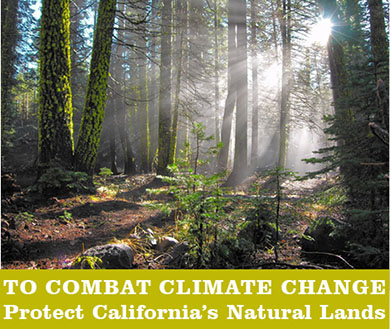Protecting California’s natural lands is key to combating climate change

http://www.sacbee.com/opinion/op-ed/soapbox/article7842339.html
By Andrea Tuttle
 As a kid, I loved camping. In the pines of the Sierra, I learned the joy of nature and the cycle of life. As a biologist in college, I learned how truly essential our forests, wetlands, farmland and rangelands are to our very existence. These landscapes produce oxygen, capture rain and snow, grow food and fiber, shelter wildlife and provide many other environmental benefits.
As a kid, I loved camping. In the pines of the Sierra, I learned the joy of nature and the cycle of life. As a biologist in college, I learned how truly essential our forests, wetlands, farmland and rangelands are to our very existence. These landscapes produce oxygen, capture rain and snow, grow food and fiber, shelter wildlife and provide many other environmental benefits.
Today, we face climate change as our biggest environmental challenge, and these lands are more important than ever. Drought and extreme weather already impact California’s communities and economy; rising sea levels already erode our coastline.
In his inaugural address, Gov. Jerry Brown identified the important role that natural and working lands play in fighting the threats of climate change. As the Legislature now negotiates the newly released budget, putting investments into natural and working lands is crucial to ensuring those carbon benefits happen.
California’s pioneering law, Assembly Bill 32, supports innovative solutions to meet the state’s ambitious climate-change goals and prepare for the impacts of carbon pollution. Right in our own backyard is one of the largest and most cost-effective tools that is already functioning – active carbon storage and removal provided by natural lands.
Forests are a huge carbon-storage bank, and represent our largest opportunity to remove carbon dioxide already in the atmosphere. When forests are lost to development, fire or degradation, they become a major source of emissions. Investments made now to retain and restore forests to healthy, resilient conditions will ensure the carbon bank stays intact and continues to grow. Forested watersheds also supply much of the state’s water, so ensuring those lands stay healthy above the dams is key to implementing the state Water Action Plan.
Wetlands, too, are major storage banks, removing carbon from the atmosphere and storing it in soils and vegetation. These thriving ecosystems protect communities from sea level rise and storm surge, offer natural water storage, improve water quality and provide vital habitat for much of California’s diverse wildlife. With less than 10 percent of the state’s wetlands remaining, investments can help protect and restore these areas for long-lasting benefits.
Preventing the loss of farm and rangeland and improving farm practices reduce harmful emissions in multiple ways. Studies show that developed urban land emits far more pollution than farmland. Using organic fertilizers and other soil management practices can capture large amounts of carbon that would otherwise enter the atmosphere. And every year, more California farmers are harnessing the power of on-farm renewable energy.
Urban parks and forests are also important. They help cool cities, reduce carbon pollution and improve health where most Californians live. Providing green space can break the cycle of neglect in California’s most disadvantaged communities, while capturing rain, shading buildings, cooling pavement and recharging groundwater.
Yes, attention to energy efficiency, renewables and cleaner fuels is crucial in the fight against climate change, and we must invest there. But the challenge cannot be met without also including the natural and working landscape.
The lands we invest in now, to grow and capture carbon, not only deliver immediate climate benefits, but also help bridge the gap while new technology comes online. The competition for budget funds is fierce, but we must remember the dividends that preserving forestland and open spaces will pay in the future. Just like a retirement account, the sooner we start, the greater the benefits.
Andrea Tuttle, former director of the California Department of Forestry and Fire Protection, is an Arcata-based consultant on forest and climate policy.
